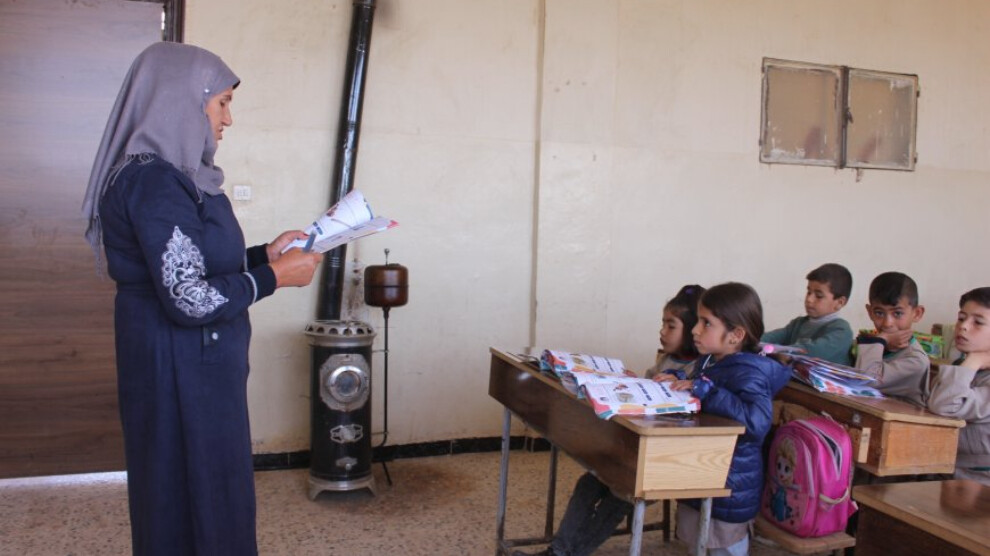A life for language: Hemdiya Seyfedin’s struggle for Kurdish
Hemdiya Seyfedin, once denied education under the Ba'ath regime, became a teacher and a pioneer in Kurdish literacy thanks to the Kurdistan Freedom Movement.
Hemdiya Seyfedin, once denied education under the Ba'ath regime, became a teacher and a pioneer in Kurdish literacy thanks to the Kurdistan Freedom Movement.

Originally from the village of Girke Xelo, east of the city of Chilaxa in the Jazira (Cizîrê) Canton, Hemdiya Seyfedin was born in 1975 and has been fighting for the Kurdish language for more than 30 years. During the rule of the Ba'ath regime, she was never able to attend school, and her family’s financial situation made it impossible for her to learn to read and write.
Her efforts to become literate and to learn her own language began in the 1990s, a time when the Kurdistan Freedom Movement had entered one of its most widespread and collective phases.
Seyfedin told ANHA that during those years, many guerrilla fighters came to their village as the Freedom Movement reached a new height. She explains that the guerrillas worked to raise awareness of identity, culture, and language, and that she was deeply moved by the knowledge they shared. After encountering the Freedom Movement through the guerrillas, she says she felt a strong desire to strengthen her understanding of Kurdish identity, culture, and language.
Seyfedin still keeps a copy of ‘Rojda’ magazine
Seyfedin, who was illiterate at the time, says she felt a deep sense of determination whenever she saw those around her reading books while she could not. Her first step was to begin learning her mother tongue, Kurdish, with great excitement. In the 1990s, she received her first Kurdish language lesson from her brother, a revolutionary in the Freedom Movement.
Once she learned the language, she began reading books written in Kurdish and using the Latin alphabet by Abdullah Öcalan. These were the years when the Kurdish identity, language, and anything related to Kurdishness were strictly banned. At the time, she read Rojda, the only Kurdish-language magazine in circulation. Hemdiya still keeps a copy of Rojda with her to this day.
A fighter for women's freedom and language
Seyfedin did not limit herself to working on language alone. As she became more involved in community organizing efforts, her understanding of freedom deepened, and she began to take a clear stance against patriarchal mindsets. During that period, as her awareness of life and society grew, she wished to join the Freedom Movement. Although the conditions of the time did not allow her to do so, she continued her struggle with even greater determination, guided by the principles of freedom she believed in. One of the most significant steps she took was to reject the societal pressure placed on women to marry. Seyfedin, who never married, made a conscious decision to resist this imposed narrative. Now 50 years old, she has dedicated her life entirely to the education of society and children.
Educating children
Once she had learned the language, Seyfedin joined with friends to begin teaching children in her village and in surrounding areas. With this aim, she formed small groups and quietly offered mother tongue lessons in secret.
A new chapter with the July 19 Revolution
Seyfedin describes the 19 July Revolution (the beginning of the Rojava Revolution in 2012) as a turning point in her life, calling the days when women led the revolution and revolutionary steps were taken in language one of the most beautiful times of her life. During this period, she actively took part in education and language initiatives. She brought together all the women in her village and began offering Kurdish language lessons at the local school. When the Kurdish Language Institute (Saziya Zimanê Kurdî – SZK) was established, Seyfedin also joined its efforts. There, she advanced her knowledge of the language, obtained a certificate of learning, and began teaching children and women. In addition to her work with the institute, she also attended online Kurdish language education programs. When the Kurdish Language Academy was established, she completed her studies there and earned her official teaching certificate.
Today, Seyfedin continues her work at her village school, proudly carrying the title she earned through her own efforts: Kurdish language teacher.
Protecting our language is our duty
Seyfedin, who has been engaged in the struggle for language for 31 years, expressed her hope that everyone would take part in this effort, and concluded her words by saying: “We only heard our language from our mothers and fathers. The regime did not allow us to read or write. That’s why everything related to Kurdishness had to be done in secret. It was deeply meaningful to us. The Kurdish language is the meaning of our identity and our very existence. Every Kurd’s fundamental duty should be to protect their language. With this belief, I took on the responsibility of language, and I will fulfill that duty until my last breath.”